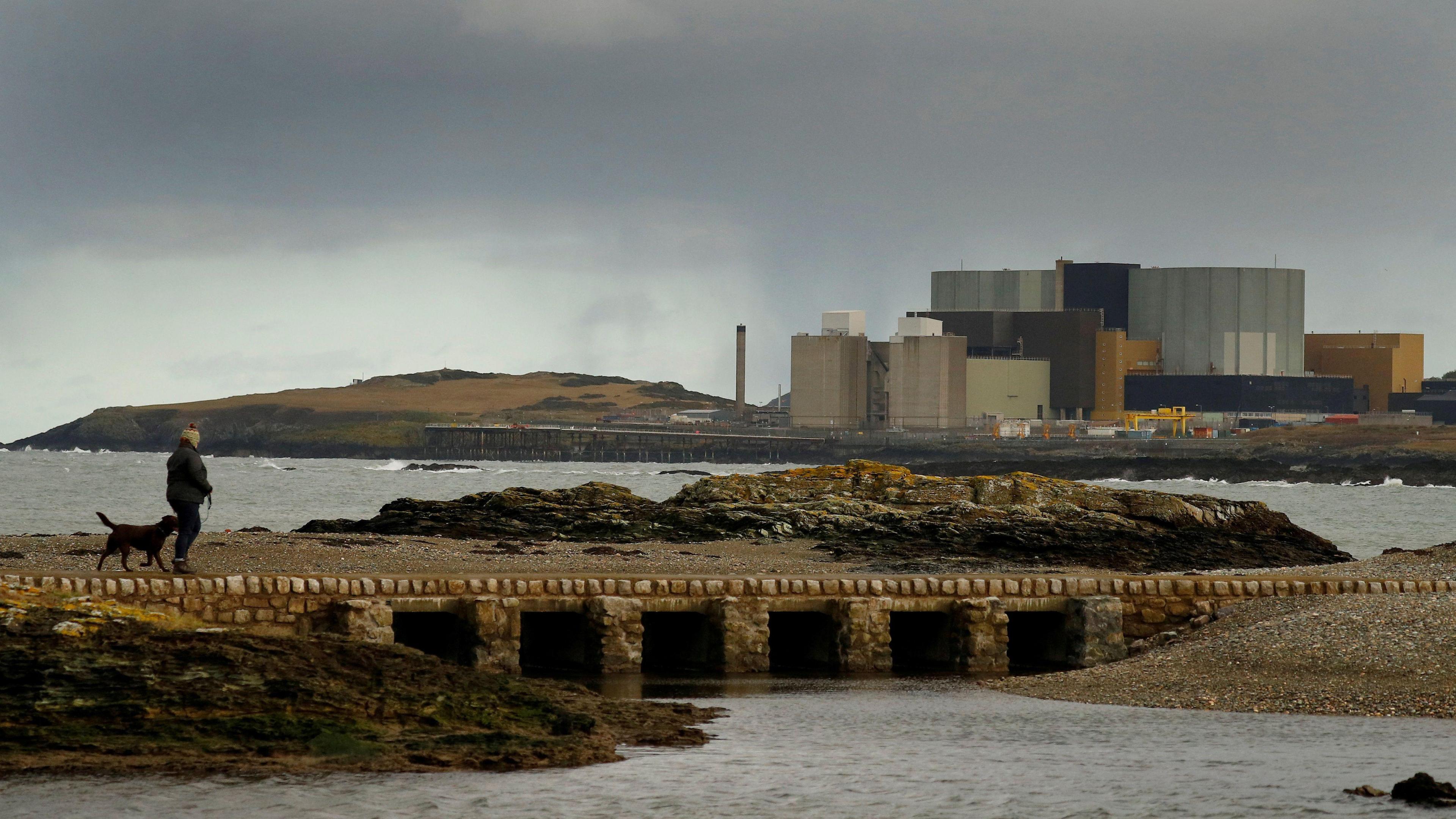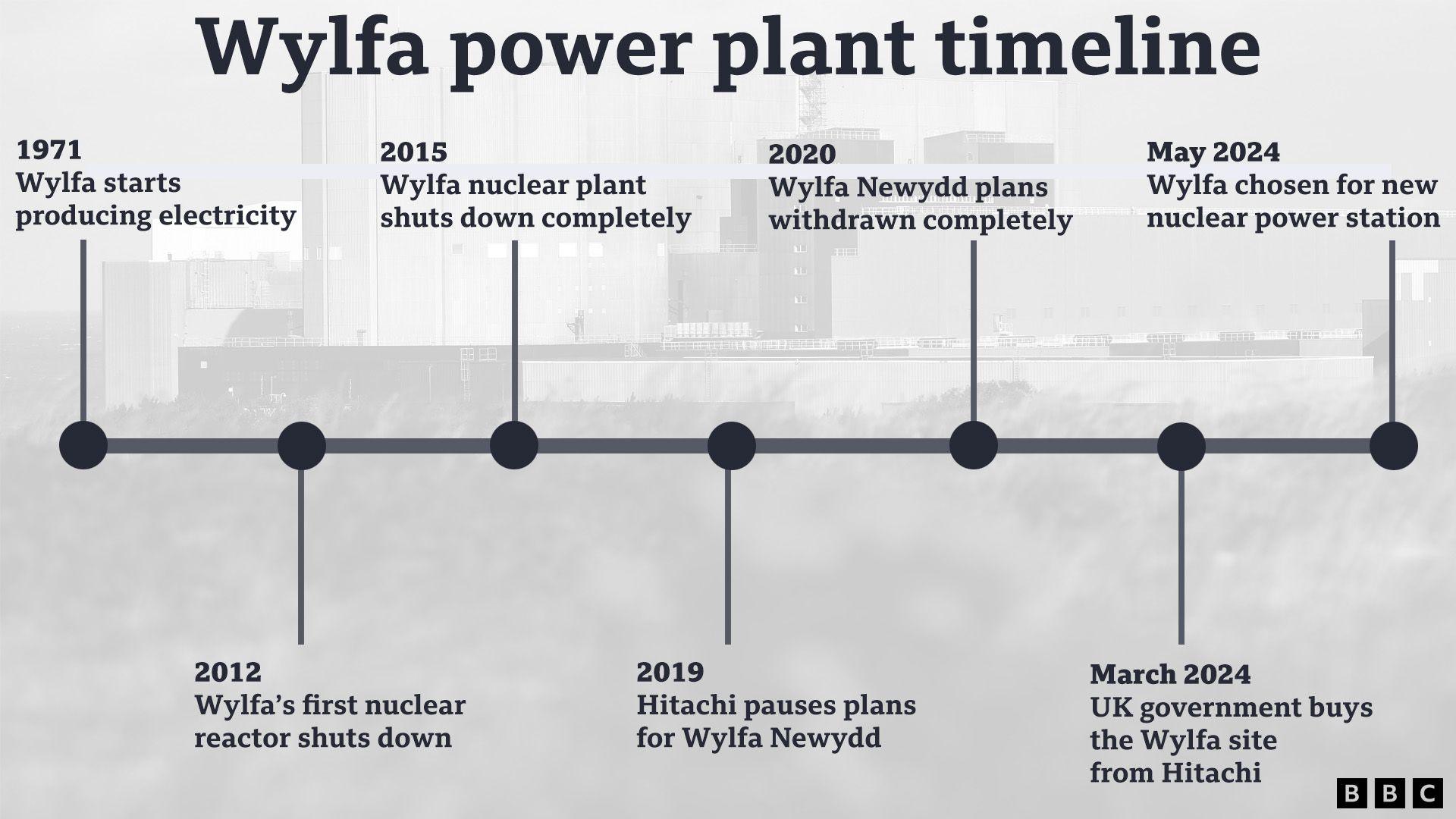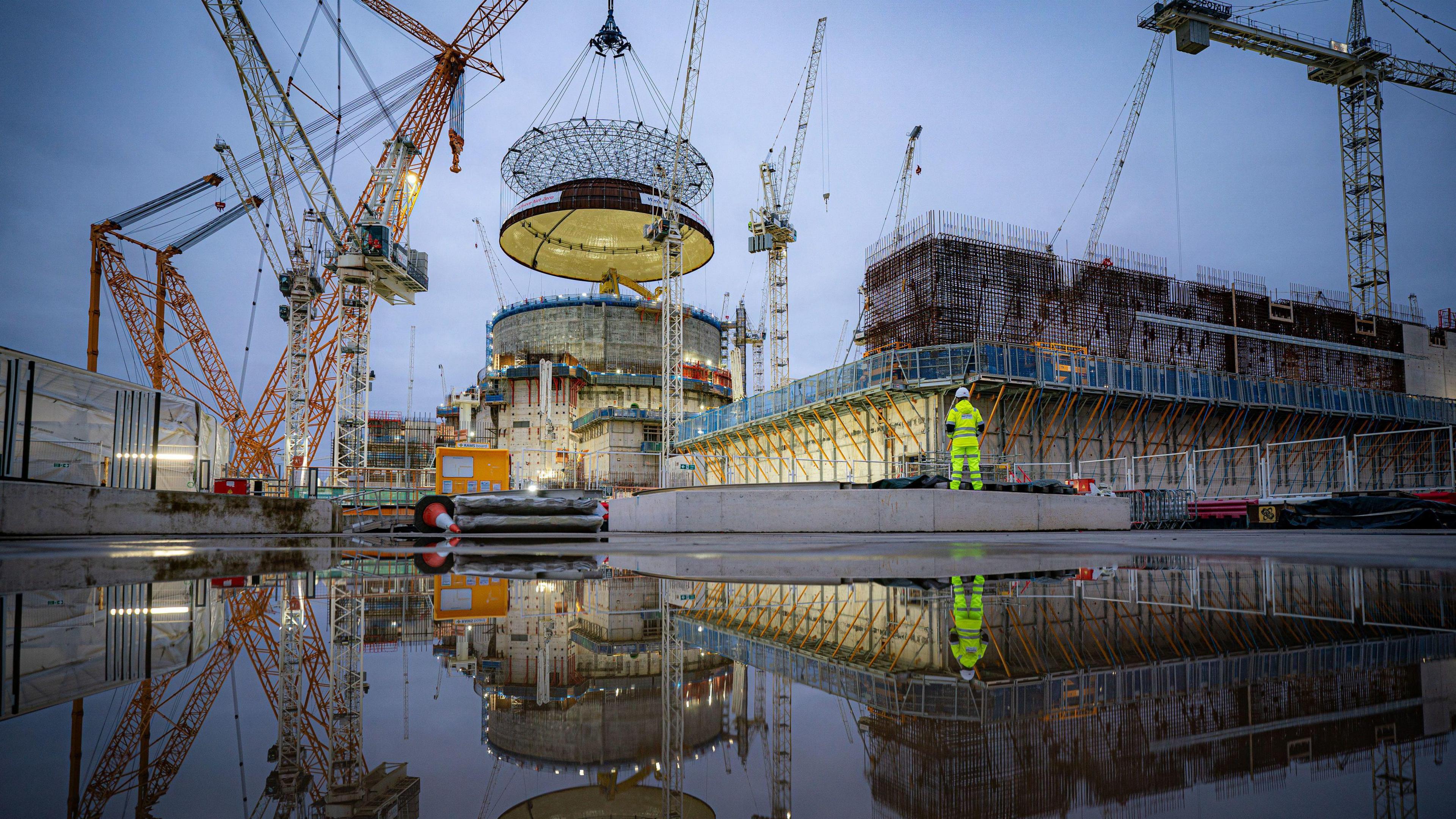Wylfa chosen for new nuclear power station

Wylfa's previous power station stopped generating energy in 2015
- Published
Wylfa on Anglesey has been chosen as the preferred site for a large-scale nuclear power plant, the UK government said.
The site was bought by ministers for £160m from previous developers Hitachi who abandoned plans for a new reactor in 2019.
International energy companies have begun talks with the UK government to start building the new Wylfa plant.
UK government Energy Secretary Claire Coutinho said the site would provide "thousands of well-paid jobs".
What is Wylfa? The long and complex story explained
- Published22 May 2024
UK government to buy Wylfa site in £160m deal
- Published6 March 2024
Sunak urged to end Wylfa nuclear 'uncertainty'
- Published3 March 2023
Welsh Secretary David TC Davies, said he won’t "put a date" on when a power station could be built, but said Wylfa is "destined to have a nuclear power station".
Asked if a new power station would be ready by 2040, he said "it’s traditionally taken a longish time" but that several international energy companies were interested in investing in the site.
Speaking on Radio Wales Breakfast, he said he’d "informally met" representatives of the South Korean energy company Kepco, who he said were "very interested".
On X, First Minister Vaughan Gething said: "I welcome today's news that Wylfa is the preferred site for a large-scale nuclear power plant.
He added that the Welsh government were ready to work in partnership and waiting further information from UK government.

For Wylfa, the starting gun is out of its box, but it has not yet been fired.
For all the anticipation that the site will once again generate nuclear power, the reality of securing an operator and delivering the project requires years of planning and investment.
The UK government insists the aspiration is clear: it bought the Wylfa site from previous developers Hitachi in order to bring back nuclear power, not to graze sheep on the Anglesey coast.
The immediate pressure on ministers will be to secure an operator, before any certainty can be attached to the cost and completion date.

Energy Secretary Claire Coutinho hailed Anglesey's "proud nuclear history" in choosing Wylfa as the government's preferred site
The new power station would be on a similar scale to the new plant at Hinkley in Somerset and the proposed development at Sizewell in Suffolk.
The site is located on the north coast of Anglesey and first had a nuclear power station in the early 1970s.
The UK government wants to quadruple nuclear power capacity by up to 25 gigawatts by 2050 with a new fleet of plants, as older power stations reach the end of their operations.
"Anglesey has a proud nuclear history and it is only right that, once again, it can play a central role in boosting the UK’s energy security," Ms Coutinho said.
She added Wylfa would bring "clean, reliable power" to millions of homes and create "thousands of well-paid jobs" and investment for north Wales.

Wylfa would operate on a similar scale to the new Hinkley Point C power station, currently under construction in Somerset
Wylfa’s previous power station stopped generating energy at the end of 2015.
Japanese operator Hitachi cancelled plans for a new nuclear reactor in 2020 and mothballed the site.
During the spring Budget, Chancellor Jeremy Hunt announced the operator had sold the site to the UK government.
Jo Stevens, UK Labour’s shadow Welsh secretary, said that "any progress is welcome" but that the people of Anglesey will "believe it when they see it".
"It’s been five years since ministers sat back and watched as the previous plans for Wylfa fell through... that project would have been 50% completed by now," she said.
Plaid Cymru said any plans to develop Wylfa must centre around the needs and interests of local communities.
But the party warned that without any further details or timescales, the announcement “doesn’t offer anything but warm words”.
Margaret Clarke, who volunteers at Caffi Mechell in Llanfechell, said: "I think it's a marvellous opportunity - for the young people especially.
"Now it's going to bring well paid jobs which are so desperately needed on the island."

Margaret Clarke, who volunteers at a cafe on Anglesey, said she knows many people who used to work at Wylfa
Owen Roberts, who lives in Llanfechell and has worked in the nuclear industry for almost 60 years, said he was pleased at the news.
"I’m excited and thrilled to have it on our doorstep again on Anglesey and north Wales to get work for the youngsters," he said.
Analysis by Gareth Lewis, BBC Political Editor
This sort of thing looks good in an election year. And this is a constituency that will be fought over by Conservatives, Labour and Plaid Cymru.
Nuclear projects bring with them prestige, the promise of thousands of jobs, they help meet green targets and they look big and shiny - at least in an artist’s impression.
Wylfa has been here before. The brave new nuclear dawn on Anglesey always has the dark cloud of bitter past experience looming on the horizon.
Today is a step, with many more to go over decades, especially on cost… long after the 2024 General Election is ancient history.
'A dinosaur that should not be resurrected'
People Against Wylfa B (Pawb), a campaign group that opposes nuclear power on Anglesey, called it a "dinosaur" that "should not be resurrected".
The group called for greater investment in renewable energy schemes that use wind, solar a hydro power instead.
Linda Rodgers, a member of Pawb, said the site could not be built in time to help the climate crisis.
"We need to be investing in the sort of jobs and energy provisions which is sustainable and can be built quickly," she said.
The Financial Times reported South Korean state energy company Kepco, external was among those in early talks with ministers over the new Wylfa power plant.
A partnership between Bechtel and Westinghouse has also expressed an interest in building the new Wylfa plant.
The decision has been praised by unions, with Prospect and GMB noting the importance of nuclear energy in hitting the UK's net-zero targets and providing jobs.
Sue Ferns, Prospect's deputy general secretary, said the site will maintain well-paid and highly skilled jobs and provide a "major boost to the Welsh economy".